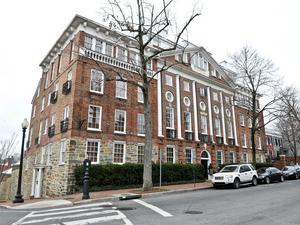
The D.C. area ranks among the world’s top 20 startup ecosystems, but it sits in the middle of the pack.
That’s per a study released Tuesday by San Francisco’s Startup Genome, a policy and research organization focused on startup ecosystems. The “Global Startup Ecosystem Report” pegs the nation’s capital at No. 11 globally and No. 6 in the U.S.
The Washington region first landed at No. 16 globally in 2019, the first year it was included in the report. It then shot up to No. 10 in 2020, before losing some ground and slipping to No. 11 in 2021. That’s the position it holds again this year, behind the top 10 global startup ecosystems:
- 1. Silicon Valley
- 2. New York (tie)
- 2. London (tie)
- 4. Boston
- 5. Beijing
- 6. Los Angeles
- 7. Tel Aviv, Israel
- 8. Shanghai
- 9. Seattle
- 10. Seoul, South Korea
The report has tracked the entrepreneurial landscape with this data since 2012, eight years before the Covid-19 pandemic would catapult tech companies to new heights across geographies. And today, the D.C. metro stands strong on a few metrics including the volume and involvement of active local investors, and the number of significant exits for homegrown startups over the past decade.
The region also scored well for its life sciences infrastructure (think: accelerators and incubators, research grants, hospitals and labs), as well as its talent, according to the report. But cost, based on average software engineer salary ($88,000 in 2021 in D.C.), and life sciences quality — of instruction and research at local universities — brought down its overall score in the rankings.
The D.C. area’s rich, well-educated talent pool has long been seen as a benefit for recruitment at local companies, as has its identity as the nation’s capital. But other inherent qualities, like the high cost of living, have challenged the region to rise among the best of the best. The pandemic-driven shift to remote work has also complicated that picture, giving workers more flexibility to live where they want.
Startup Genome based its overall rankings on six metrics: performance, or the ecosystem’s value, exit activity and startup successes (30% of the overall score); funding, including access to capital and investor activity (25%); market reach, which measures early-stage startups’ access to customers (15%); connectedness to the global landscape (5%); experience and talent across tech, life sciences and other relevant areas (20%); and knowledge, or the degree of startup experience within the local community (5%). Here’s how the D.C. area stacked up, scored on a scale up to 10 points:
- Performance: 8
- Funding: 6
- Connectedness: 8
- Market reach: 7
- Knowledge: 3
- Talent and experience: 8
Still, the D.C. region “has been gaining a reputation as a startup hub,” the report states, citing a growing pool of tech talent, and proximity to both the federal government and “an abundance of Fortune 100 companies headquartered in the area.”
And that has caught the attention of investors, with $4.9 billion raised across 334 deals in 2021 across the District, Maryland and Virginia. That was more than double the $1.96 billion raised in 2020, according to the data.
From the second half of 2019 to 2021, local startups raised a total $2.2 billion in early-stage funding, dwarfing the global average of $687 million. Area companies raised a median seed round of $775,000, higher than the $671,000 national average, and median Series A round of $6.2 million, more than the $4.7 million national average, per the report. Total venture capital funding flowing into the ecosystem from 2017 to 2021 totaled $12 billion, well above the global average of $4.5 billion during that time. Though, the average time to exit over those four years was 10.5 years, a year longer than the global average.
The local scene confronts the same dynamics as the national and global stages, which saw exits at inflated valuations through 2021.
“While inflation in funding valuations fuel an acceleration in the growth of entrepreneurial ecosystems and innovation in general — with larger checks essentially meaning more money is invested in startups for the same percentage dilution — it is not without risks for startup ecosystems,” the report notes. “It often spells lower returns for investors for the affected vintage investments. For startups (and for investors) this raises the specter of down rounds as the market goes back to near-historical valuations before their next round.”
Now with inflation and rising interest rates, paired with the war in Ukraine, we’ve seen a slowing of that trend, the report reads, and “startups will benefit from adopting adjusting their growth strategy by reducing their burn in order to lengthen their runway and delay their need for capital, and do so rapidly and assertively.”
Even so, we’ve seen a growing number of companies this year blow past the $100 million mark in consistently large rounds and clinch unicorn status, amid efforts to funnel funding to younger ventures.




